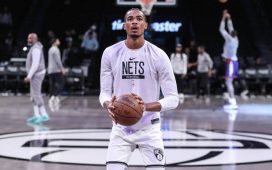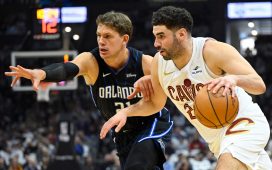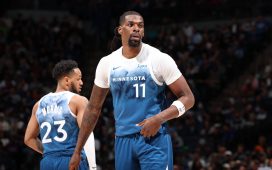In the aftermath of Kevin Durant’s pre-free agency bomb of a trade request, the seismic shockwaves reverberating around the league have certainly made their way to Phoenix, one of Durant’s preferred destinations.
The Suns profile as a perfect situation for Durant. They are a ready-made contender in an appealing market with a pair of established stars and leaders — Chris Paul and Devin Booker — who he respects.
Durant is a champion of the midrange and its importance in a playoff setting. Booker and Paul live there. That trio, surrounded correctly, would attack defenses in a way Durant adores, kind of like a cross-conference version of what he presumably envisioned before the Kyrie Irving, James Harden core blew up in Brooklyn.
Management also matters within this equation. Durant is a veteran of several situations. His travels have surely taught him the importance of an alignment with general manager and coach. James Jones is respected throughout the league. Durant actually faced him in the 2012 and 2017 Finals, when Jones was a member of the Heat and later the Cavaliers.
His connection to Monty Williams is deeper. The Thunder hired Williams for Durant’s last season in Oklahoma City, in part, because of the Washington, D.C. connection between the two. Williams worked with Durant regularly before family tragedy struck in February of that season and Williams was forced to take a leave of absence from the Thunder.
Williams later resurfaced as the head coach of the Suns and among his hires was assistant coach Mark Bryant, the Thunder’s long-time big man coach who has a strong connection with Durant.
Kevin Durant on three huge influencers in his post defense: Kendrick Perkins, Mark Bryant, Monty Williams pic.twitter.com/CjXepH0LZ7
— Anthony Slater (@anthonyVslater) December 1, 2016
So you can see why Phoenix is an appealing landing spot for Durant. It brings familiarity and a chance to spark up a competitive conference rivalry with a Warriors team he’d get a realistic crack at dethroning on the playoff stage. That’s a matchup the league could market next season.
But how exactly can Durant find himself in Phoenix? His towering presence in a league known for its player empowerment gives him some level of leverage in any negotiation. But he signed a four-year max extension last summer with no opt-outs. It triggers this upcoming season. He’s under team control until the summer of 2026, giving the Nets a whole lot more leverage than most franchises forced into these trade-me-or-else scenarios.
Considering the Nets’ situation, though, the Suns should have a competitive offer in the marketplace. Remember what Brooklyn gave up to acquire James Harden? This is the pick package it delivered to the Rockets: 2023 first-round pick swap, 2024 first-round pick, 2025 first-round pick swap, 2026 Nets first-round pick, 2027 first-round pick swap.
That means Houston controls Brooklyn’s draft for the next five years, stripping away any incentive for the Nets to descend into a patient teardown and rebuild. They should still be motivated to recoup some draft capital in any Durant deal, but players who can help them compete in the immediate hold substantial value.
That’s what should drag Phoenix into the inner circle of trade partners. Their first-round picks for the next several seasons don’t have immense value, but any team acquiring Durant will be a presumed contender the next handful of seasons, delivering first-round picks in the 20s back to Brooklyn. The Nets could prioritize pick swaps and first-rounders out in the 2026, 2027, 2028 and 2029 range, given that a core that includes Paul and Durant would likely age out by then. Phoenix has all of its future first-round selections still in its cupboard.
Then you get to the player side of any theoretical package. Part of the reason Durant’s timing on this trade request is important is because it arrived before free agency begins and Deandre Ayton officially makes his decision. Ayton is a restricted free agent who does hold some level of power in this process. If he signs an offer sheet somewhere in the opening days of free agency — the Pacers, for example — any trade conversations between the Suns and Nets would get more complicated.
But Ayton is eligible to be roped into a sign-and-trade with the Nets if he agrees to go to Brooklyn, giving the Nets long-term control of one of the best young centers in the league. Add his max or near max salary to Mikal Bridges — who is just entering the first season ($21 million) of a reasonable four-year, $90 million contract — and you’re into the Durant range of matching salary. Durant is making $42.9 million next season.
Would Ayton, Bridges and a bunch of future firsts be enough for Durant? Would Cam Johnson, extension eligible and earning $5.8 million on the final season of his rookie deal, need to be added?
You can probably concoct better theoretical deals for Durant. A core of Ayton, Bridges and Ben Simmons sounds incredible defensively, but where’s the offensive creation on the perimeter? It would be an odd fit and, using Kyrie Irving and perhaps Simmons in an eventual trade, some extra roster rearranging would likely be needed.
There are other complications, including an incurred hard cap in an Ayton sign-and-trade scenario, that would need to be ironed out. But, as our John Hollinger laid out here, that can be solved rather easily.
But Bridges and Ayton are rising young talents far away from restricted free agency. There’s a world where those far-off Phoenix first-round picks could become gold. The Suns are in a desperate enough win-now mode that they could perhaps be had unprotected. Durant’s desire to go to the Suns would make that aspect of the negotiations clean. Plenty about the trade fit makes sense.
(Photo of Kevin Durant and Devin Booker: Brad Penner-USA Today)









